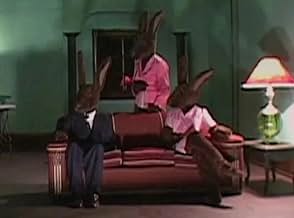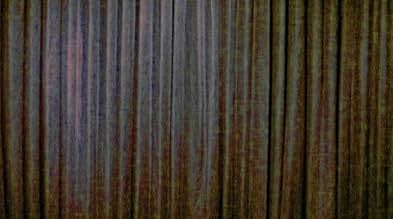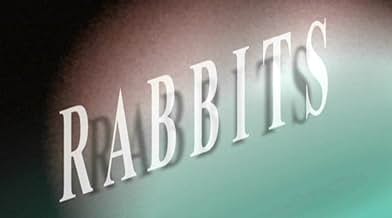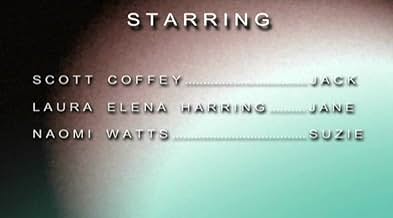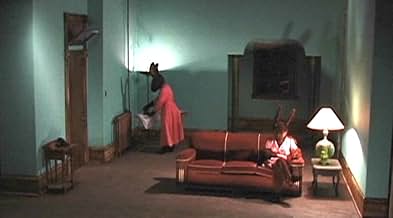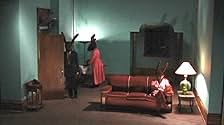Rabbits
- 2002
- 43 Min.
IMDb-BEWERTUNG
6,9/10
8851
IHRE BEWERTUNG
In einer namenlosen Stadt, durchflutet von endlosem Regen, leben drei Hasen mit einem schrecklichen Geheimnis.In einer namenlosen Stadt, durchflutet von endlosem Regen, leben drei Hasen mit einem schrecklichen Geheimnis.In einer namenlosen Stadt, durchflutet von endlosem Regen, leben drei Hasen mit einem schrecklichen Geheimnis.
Empfohlene Bewertungen
There's a technical term with which you must be familiar in order to begin to appreciate what David Lynch has created with this remarkable web series. That term is Diegesis which essentially means that the voices or sounds are in fact part of the world and moment which we are witnessing on screen. In the case of Rabbits it's a very intentionally open question as to just when and where and from whom is originating the spoken dialog, reinforced by the fact that we aren't able to see anyone's mouth. Perhaps the actors prerecorded their lines which are being played back as a soundtrack as they pantomime their roles? Or maybe the voices were overdubbed after the drama was videotaped? Do the words we are hearing even have anything at all to do with what we are watching? Are the words intentionally misleading so as to throw us off the trail of the real story? Is the dialog intentionally fractured & scrambled so as to disrupt any possible linear, literal comprehension? Was the dialog lifted from another source altogether?!
More questions: Are the characters, in fact, aware of each other? Maybe they are figments of each other's imagination? Maybe they are reminiscing about their pasts, recalling individual episodes of personal experiences which hold meaning only to themselves? Do these characters live together, or maybe they each individually lived in the grim apartment consecutively? Is the male rabbit a visitor? Why does the unseen, possibly imaginary audience applaud excessively when he enters the room and stands oddly at the door, almost as though uncomfortable with the warm reception? Why does the mysterious audience laugh at seemingly random moments, which I at first believed occurred only in response to any mention of time or time related concepts, but this theory soon proved unsustainable? Are the rabbits related? Is one of the female rabbits the mother and the other the wife? And just who or what the hell is that bizarre mouth like orifice that occasionally appears and drones incomprehensibly while one rabbit conducts what might be a ceremonial ritual with flashlights? And what of the intermittently igniting match that burns into the upper right corner of the screen as though signaling a moment of particular import, and which sort of resembles those odd circular dots in older films that alerted the projectionist to an imminent reel change?
Rabbits is anything but definite; it's so thoroughly, utterly indeterminate, uncommitted, tenebrous. Is it a simple Post Modern theatrical production being staged on successive nights - nine brief episodes totaling 50 minutes? Or is it a piece of Off Broadway Absurdist Theater intended as an homage to a time when commercial theater tolerated more daring, more experimental forms of drama? Is it an Off Off Broadway production still in rehearsals? Is it a security cam recording of a bit of extra curricular thespian activities? Or maybe it's even some bizarre theatrical cult that nightly conducts pagan rituals to appease the fickle and malevolent Drama Gods? Is it taking place in a theater, or on a Hollywood sound stage, or on the set of a show that David was perhaps hoping to convince some unusually brave or foolish TV executive to televise? Is it just a video record of shenanigans with some of Lynch's friends, made for their own amusement? Are they aware of what they are involved in? The possibilities are limitless as well as the questions, and that seems to be the point. Well, not the point, but the method; the method of Lynch's inspired, outrageous, ridiculous, sublime madness.
What it seems to be is a purposely abstract, incoherent, ineffable expression of pure creativity. It defies all possible labels, genres and names, and seems to relish the precarious position it occupies in my baffled, bewildered, frantically deducing mind. It exudes such a sinister, almost macabre atmosphere, and yet it dares you to assume that there's anything suspicious occurring. Theater of the Absurd came into fashion in the late 50s, but the decor on stage is late 20s or early 30s Art Deco, so it may be that the furnishings have occupied this "room" for decades. Film Noir - Lynch's preferred form of cinematic expression - also came into fashion in the 50s, and the genre thrived in the same moody ominous atmosphere that this video piece exudes, thanks to Angelo Badalamenti's signature musical score which is particularly muted and subdued. The doleful, mournful wail of a distant train whistle is nearly comical and yet so poignantly evocative, as is the omnipresent gentle storm which drenches the proceedings in a corny, maudlin, overstated gloom. The stage set might bring to mind the bleak, stark TV set apartment that Jackie Gleason's Honeymooners occupied, which only adds yet another preposterously comical layer of meaning to the mix. And yet it all adds up to something indescribably eerie and treacherous.
These furry, large eared characters might be indiscriminate, random creatures functioning as placeholders, as stand ins for real actors who may one day actually perform the piece. It seems to be suggesting that characters in drama are better seen as unreal, non human entities more appropriate and consistent with the artifice and unreality of the theatrical form. Lynch may be implying that a dramatic persona is best understood as a manifestation of a more fanciful non reality, a product of imagination & fantasy, and isn't that, after all, the essence of childhood play? But then why is it all so damn taunting and threatening?! The cumulative effect - as all the dark, dreary, heavy atmosphere might dictate - however, is not at all depressing. No, on the contrary, it's very compelling and disturbing and thrilling and wonderful. And that might be the most confounding part, just how profoundly pleasant an experience is David Lynch's Rabbits.
More questions: Are the characters, in fact, aware of each other? Maybe they are figments of each other's imagination? Maybe they are reminiscing about their pasts, recalling individual episodes of personal experiences which hold meaning only to themselves? Do these characters live together, or maybe they each individually lived in the grim apartment consecutively? Is the male rabbit a visitor? Why does the unseen, possibly imaginary audience applaud excessively when he enters the room and stands oddly at the door, almost as though uncomfortable with the warm reception? Why does the mysterious audience laugh at seemingly random moments, which I at first believed occurred only in response to any mention of time or time related concepts, but this theory soon proved unsustainable? Are the rabbits related? Is one of the female rabbits the mother and the other the wife? And just who or what the hell is that bizarre mouth like orifice that occasionally appears and drones incomprehensibly while one rabbit conducts what might be a ceremonial ritual with flashlights? And what of the intermittently igniting match that burns into the upper right corner of the screen as though signaling a moment of particular import, and which sort of resembles those odd circular dots in older films that alerted the projectionist to an imminent reel change?
Rabbits is anything but definite; it's so thoroughly, utterly indeterminate, uncommitted, tenebrous. Is it a simple Post Modern theatrical production being staged on successive nights - nine brief episodes totaling 50 minutes? Or is it a piece of Off Broadway Absurdist Theater intended as an homage to a time when commercial theater tolerated more daring, more experimental forms of drama? Is it an Off Off Broadway production still in rehearsals? Is it a security cam recording of a bit of extra curricular thespian activities? Or maybe it's even some bizarre theatrical cult that nightly conducts pagan rituals to appease the fickle and malevolent Drama Gods? Is it taking place in a theater, or on a Hollywood sound stage, or on the set of a show that David was perhaps hoping to convince some unusually brave or foolish TV executive to televise? Is it just a video record of shenanigans with some of Lynch's friends, made for their own amusement? Are they aware of what they are involved in? The possibilities are limitless as well as the questions, and that seems to be the point. Well, not the point, but the method; the method of Lynch's inspired, outrageous, ridiculous, sublime madness.
What it seems to be is a purposely abstract, incoherent, ineffable expression of pure creativity. It defies all possible labels, genres and names, and seems to relish the precarious position it occupies in my baffled, bewildered, frantically deducing mind. It exudes such a sinister, almost macabre atmosphere, and yet it dares you to assume that there's anything suspicious occurring. Theater of the Absurd came into fashion in the late 50s, but the decor on stage is late 20s or early 30s Art Deco, so it may be that the furnishings have occupied this "room" for decades. Film Noir - Lynch's preferred form of cinematic expression - also came into fashion in the 50s, and the genre thrived in the same moody ominous atmosphere that this video piece exudes, thanks to Angelo Badalamenti's signature musical score which is particularly muted and subdued. The doleful, mournful wail of a distant train whistle is nearly comical and yet so poignantly evocative, as is the omnipresent gentle storm which drenches the proceedings in a corny, maudlin, overstated gloom. The stage set might bring to mind the bleak, stark TV set apartment that Jackie Gleason's Honeymooners occupied, which only adds yet another preposterously comical layer of meaning to the mix. And yet it all adds up to something indescribably eerie and treacherous.
These furry, large eared characters might be indiscriminate, random creatures functioning as placeholders, as stand ins for real actors who may one day actually perform the piece. It seems to be suggesting that characters in drama are better seen as unreal, non human entities more appropriate and consistent with the artifice and unreality of the theatrical form. Lynch may be implying that a dramatic persona is best understood as a manifestation of a more fanciful non reality, a product of imagination & fantasy, and isn't that, after all, the essence of childhood play? But then why is it all so damn taunting and threatening?! The cumulative effect - as all the dark, dreary, heavy atmosphere might dictate - however, is not at all depressing. No, on the contrary, it's very compelling and disturbing and thrilling and wonderful. And that might be the most confounding part, just how profoundly pleasant an experience is David Lynch's Rabbits.
This is one of the more bizarre films featuring humans in fluffy bunny suits.
David Lynch juxtaposes Sartrean existentialism and American sitcom with an eerie, industrial-noir soundtrack to create a compelling, hellish universe like only he can.
Also, this is maybe one of the greatest uses of bunnies in storytelling, since Lewis Carroll (with the exception of Hugh Hefner).
With the recent influx of rabbit suits in other indie films, like Gummo and Donnie Darko, one can only expect this trend to grow and explode on the catwalks of Milan and Paris.
David Lynch juxtaposes Sartrean existentialism and American sitcom with an eerie, industrial-noir soundtrack to create a compelling, hellish universe like only he can.
Also, this is maybe one of the greatest uses of bunnies in storytelling, since Lewis Carroll (with the exception of Hugh Hefner).
With the recent influx of rabbit suits in other indie films, like Gummo and Donnie Darko, one can only expect this trend to grow and explode on the catwalks of Milan and Paris.
Everyone who has seen David Lynch's Inland Empire will be familiar with the rabbits of this short film (screened in some places broken down into episodes). Personally I struggled to work out if Inland Empire was brilliant or rubbish and ultimately I concluded that it was both but that it was worth seeing because of what an unnerving and unusual experience it was. The rabbit snippets are all part of it as they meant very little to be but yet managed to actually make me feel uncomfortable and uneasy while watching them. As a result I decided to check out the full Rabbits film.
In an interviewer about Lynch's website project, someone did describe Rabbits as one for the hard-core Lynch fans and this description is bang on the money because it does deliver everything that he does well while also failing (or rather, not trying) to deliver in other, usual areas. Where the snippets hit home for me is in their sheer menacing stiffness. "Normal" things such as the apartment and the idea of a sitcom are all presented in a twisted and perverted way that Lynch viewers will be used to. Just like in Twin Peaks (where backwards characters talk in a red velvet room) the movement is strange, the lighting is eerie, the dialogue is confusing and the whole thing is delivered under a brooding score that suggests an impending destruction or evil.
In this regard the film is quite brilliant and it is very disturbing to watch it in a dark room n a quiet night. But this is also the problem with the film because there is nothing more to it and ultimately the novelty value of it wears off long before the 45 minute mark. After a while I did want more but the film just continued to deliver what it had done at the very start. Die-hard fans of Lynch will love it and take pleasure in trying to pick the meaning out of it but for me it was more a matter of hanging on until the conclusion. It is a shame because in small sections Rabbits is really well done and fascinating. Lynch's creativity is powerful and works across the board many have neglected to mention the physical actors in the film (not the famous voices) but their work is important, with a stillness and deliberate movements being key in the delivery.
Overall then a very strong film for those that love Lynch's creepy work but it is hard to ignore the fact that the running time is too long to sustain the long pauses and very slow pace. As a result it never works as well as it does in its limited use within Inland Empire. Fans should still watch it for what it does well but for the majority of viewers the running time will be far too long and boredom may take away from the uneasy and creepy delivery.
In an interviewer about Lynch's website project, someone did describe Rabbits as one for the hard-core Lynch fans and this description is bang on the money because it does deliver everything that he does well while also failing (or rather, not trying) to deliver in other, usual areas. Where the snippets hit home for me is in their sheer menacing stiffness. "Normal" things such as the apartment and the idea of a sitcom are all presented in a twisted and perverted way that Lynch viewers will be used to. Just like in Twin Peaks (where backwards characters talk in a red velvet room) the movement is strange, the lighting is eerie, the dialogue is confusing and the whole thing is delivered under a brooding score that suggests an impending destruction or evil.
In this regard the film is quite brilliant and it is very disturbing to watch it in a dark room n a quiet night. But this is also the problem with the film because there is nothing more to it and ultimately the novelty value of it wears off long before the 45 minute mark. After a while I did want more but the film just continued to deliver what it had done at the very start. Die-hard fans of Lynch will love it and take pleasure in trying to pick the meaning out of it but for me it was more a matter of hanging on until the conclusion. It is a shame because in small sections Rabbits is really well done and fascinating. Lynch's creativity is powerful and works across the board many have neglected to mention the physical actors in the film (not the famous voices) but their work is important, with a stillness and deliberate movements being key in the delivery.
Overall then a very strong film for those that love Lynch's creepy work but it is hard to ignore the fact that the running time is too long to sustain the long pauses and very slow pace. As a result it never works as well as it does in its limited use within Inland Empire. Fans should still watch it for what it does well but for the majority of viewers the running time will be far too long and boredom may take away from the uneasy and creepy delivery.
A slow, stylish, eerie and extremely interesting story set "in a city deluged by constant rain where three rabbits live with a constant mystery". Mr Lynch has a great talent for establishing atmosphere and this series is soaked with his trademark (weird) mood. When I watched the first episode I was not sure whether to laugh or be baffled at what I was seeing. 3 Rabbits talk out of sequence, an unseen audience claps whenever one of them enters the room and laughs (not because something funny is said, but at the misery of the rabbits), a candle burns in the corner, a demon face chants something undecipherable (reminds me of the litanies of Satan, the camera seems to be disturbed in the beginning of the 7 out of 8 episodes by something I can only guess to be a spirit. We hear footsteps, the door sometimes opens and the phone even rings. All to the frustration of the rabbits. I noticed a lot of people have tried to figure out what Rabbits is about and my take on it is pretty simple. Firstly, this wasn't the first time I have seen something like this, though this is definitely very well made. I read a book a very long time ago whose title I cannot remember about 2 kids who were put in a scenario similar to this rabbit house and were observed everyday by their captures. The 2 children (I only remember one child called Mavis) were unaware they were being watched and as far as they knew, they had a normal life (went out, watched TV etc) except they didn't in real life. Everything was in their mind. This seems similar to this story. The rabbits could be 'prisoners' who are being observed or kept by someone (the man in the green suit). There is however how they react to the audience (whenever they enter the room and the audience claps, they wait until the applause is finished and continue to sit down) so they are aware they are being watched. According to their dialogue, it seems to me they were once human, "Jane- were you blond?" but it does seem like they remember or who they were. They refer to each other by human names, but they seem confused or disturbed by their situation, "I wish they'd go away", probably referring to the unseen audience. The last episode offers a good climax but not a conclusion. Or is it? Are the rabbits unable to figure out a way out of their misery...or is this their reality as it always has been? Like the book I read, the children never did escape their house, but they did figure out they were not living a 'normal' life. Lynch has never been one to offer a comfortable conclusion to his work- so I would not be surprised if this is the end for his rabbits.
The easy verdict - it is a David Lynch ! This explains all and offers some comfort to viewer.
In fact, it is a Ionesco play. Or a sitcom reduced to its essence. Three rabbits in a room. Their words, without sense, prepairing the audience for a presumed revelation of a secret. But, except the entries of father/ husband, the laughts from public and the rolling words saying just nothing, in fact, but offering powerful images , maybe , nothing.
So, easy to see another show. But fascination / curiosity just works well in this case, the rabbit heads - and their shadows - , like the creepe voice in dark are good points and you have the privilege to craft the coherent story, from the recipe of The Others bz Alejandro Amenabar to Who s afraid of Virginia Wolf ? Or. Waiting for Godot .
In fact, it is a Ionesco play. Or a sitcom reduced to its essence. Three rabbits in a room. Their words, without sense, prepairing the audience for a presumed revelation of a secret. But, except the entries of father/ husband, the laughts from public and the rolling words saying just nothing, in fact, but offering powerful images , maybe , nothing.
So, easy to see another show. But fascination / curiosity just works well in this case, the rabbit heads - and their shadows - , like the creepe voice in dark are good points and you have the privilege to craft the coherent story, from the recipe of The Others bz Alejandro Amenabar to Who s afraid of Virginia Wolf ? Or. Waiting for Godot .
Wusstest du schon
- WissenswertesDescribed by Lynch as a 9 episode sitcom.
- VerbindungenFeatured in Inland Empire (2006)
Top-Auswahl
Melde dich zum Bewerten an und greife auf die Watchlist für personalisierte Empfehlungen zu.
- Was this a TV series?
Details
- Laufzeit43 Minuten
- Farbe
- Seitenverhältnis
- 1.78 : 1
Zu dieser Seite beitragen
Bearbeitung vorschlagen oder fehlenden Inhalt hinzufügen


